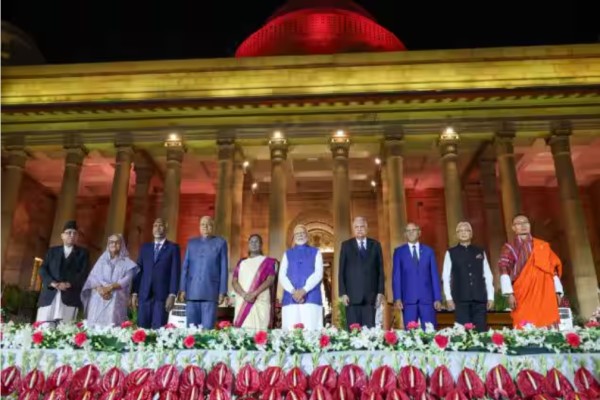Prime Minister Narendra Modi seems inspired by the Biblical commandment ‘Love Thy Neighbour as Thyself.” His commitment to India’s ‘Neighbourhood First’ policy and ‘SAGAR’ doctrine has earned him enormous goodwill.
He reiterated this promise while meeting leaders from India’s neighbourhood who attended the swearing-in ceremony of the new government at Rashtrapati Bhavan on June 9.
There has been no dearth of congratulatory messages from world leaders. But the front-page coverage and media commentaries in neighbouring countries on Modi’s historic return appear to be mixed, although most believe that his leadership is good for regional stability.
“The most important story is that the politics of hate that had become the mainstay of Indian politics in the past decade under Modi has faced a setback,” analyst Dinesh Kafle writes in an article titled ‘A setback for politics of hate’ in Nepal’s leading English daily, The Kathmandu Post.
However, “the Modi era is far from over yet,” he warns. Despite the change in the numbers, Modi will remain at the centre of Indian politics, albeit with loss of sleep over a possible paltibaaji (revolt) by his partners, he says.
Sulocahana Ramiah Mohan, Deputy Editor of Ceylon Today, told StratNews Global that Sri Lanka had anticipated Modi’s return.
In an article in Ceylon Today, Sulochana writes, “ Sri Lanka and other smaller islands in the Indian Ocean Region will continue their love-hate relationship with India, and Modi will surely call the shots, settling his scores evenly or unevenly using his think alike man, Foreign Minister S. Jaishankar.’’
In the current geopolitical scenario, it makes sense to have Modi in terms of counterbalancing China and ensuring maritime and regional security, she says. “ As a person living in an Island nation that takes support from countries like India, I feel that there can’t be a better team than Modi and Jaishankar. Although he prioritized India’s immediate neighbours with his Neighbourhood First Policy and mooted SAGAR doctrine early in his first term in 2014, I feel that Sri Lanka’s growth has not been at par with that of India.
“Since he has been heading the government for ten years, India can do a lot more to make this region powerful. Sri Lanka could benefit more if India were to scale up industry in Sri Lanka and encourage Sri Lankans to work in India just as Bangladesh and Pakistan extend work opportunities to Sri Lanka.’’
In an opinion piece titled ‘ For regional peace and glory’ on June 11, The Kuensel, Bhutan’s leading newspaper, said that “strong leadership from India can serve as a stabilizing force in these volatile times, fostering peace and prosperity throughout South Asia.’’
Prashanta Kumar Shill, international political analyst, in an article titled, ‘ How Modi lost despite his win’ in The Dhaka Tribune, says that the Bharatiya Janata Party, led by Narendra Modi for the past decade, will now be at the mercy of its alliance partners. “Modi might now need to follow the principle of harmony as questions about the stability of the coalition government arise,’’ he said.
Meanwhile, career diplomat Dr S Jaishankar, who resumed responsibilities as External Affairs Minister on Tuesday, asserted that India’s foreign policy under the third term of Prime Minister Narendra Modi will focus on finding solutions to “border issues” with Beijing and the “years-old cross-border terrorism” with Islamabad.
He noted that both the neighbouring countries present unique challenges and India’s relations with them are different.
“Our focus with regard to China will be on finding a solution for the border issues,” Jaishankar said, signalling India’s commitment to resolving territorial disputes through dialogue and diplomatic channels.
He also emphasised the multifaceted growth of India’s influence on the global stage.
















